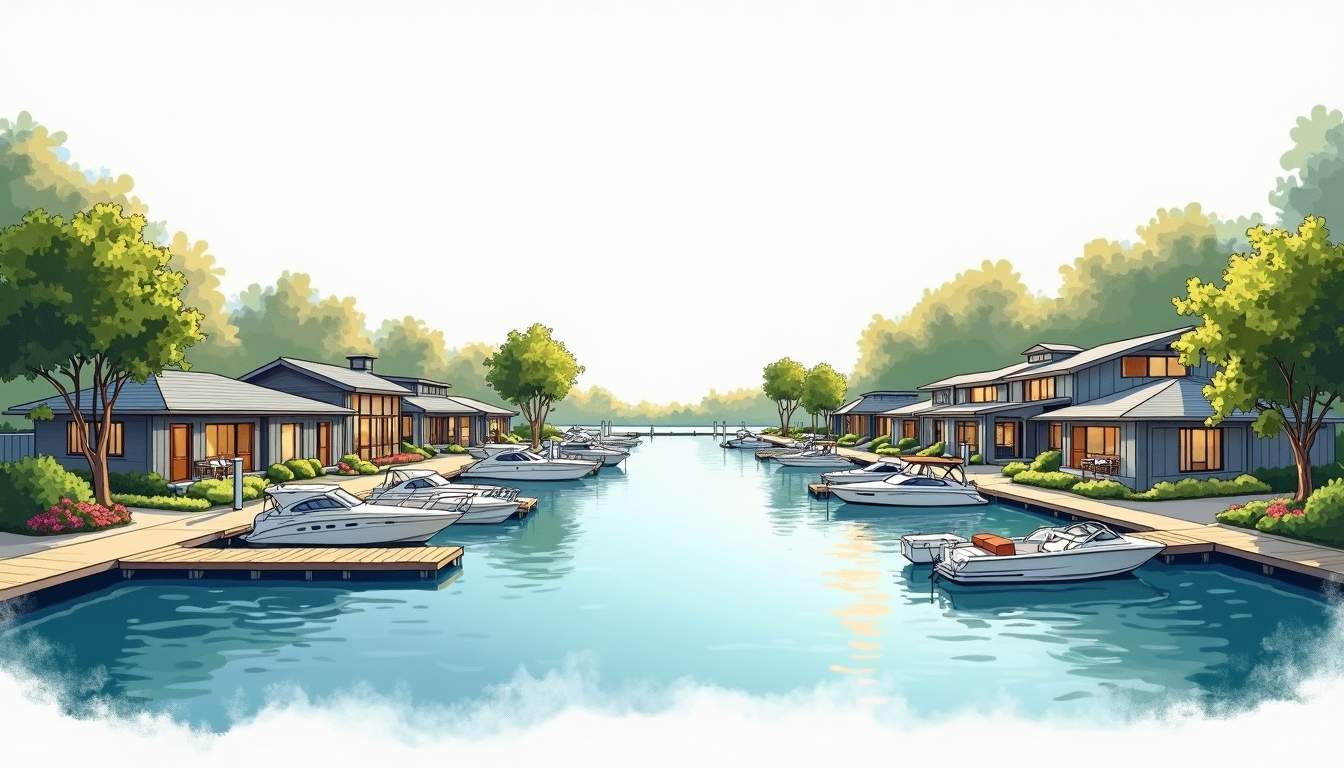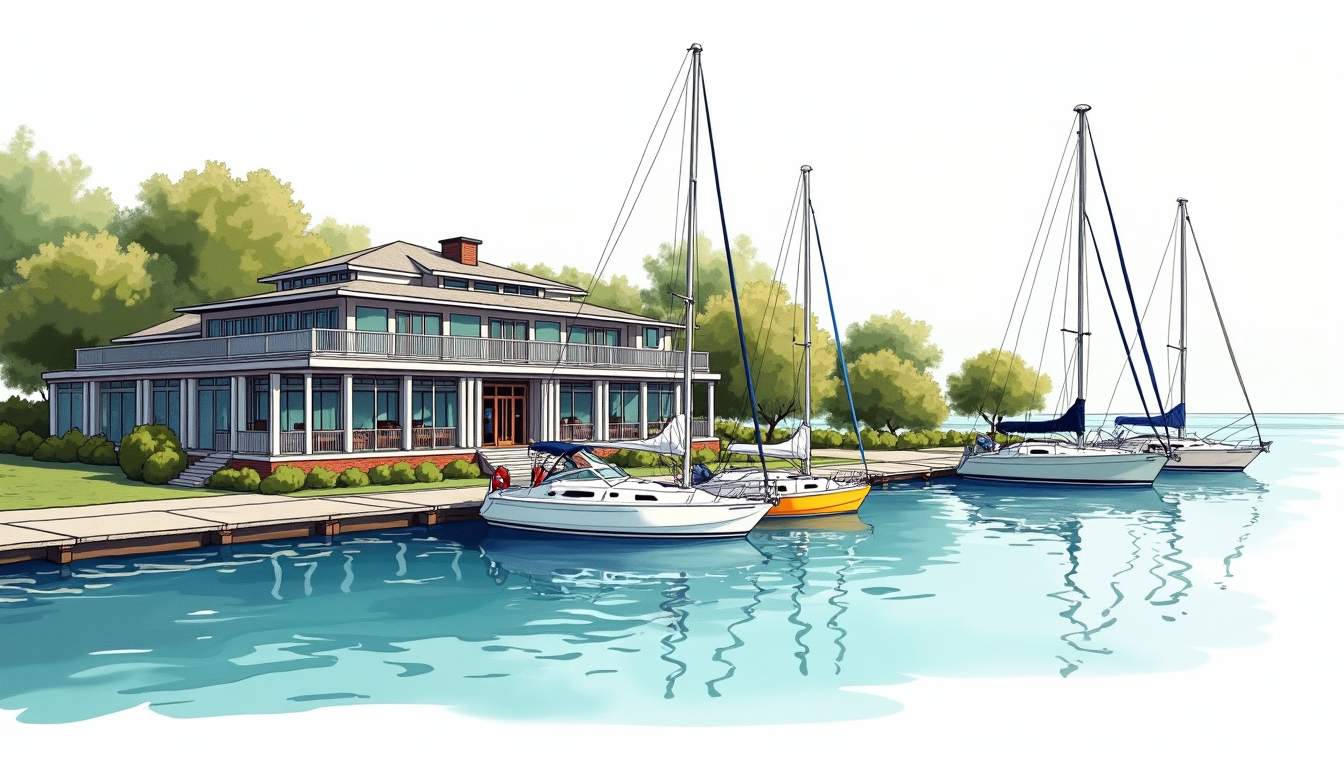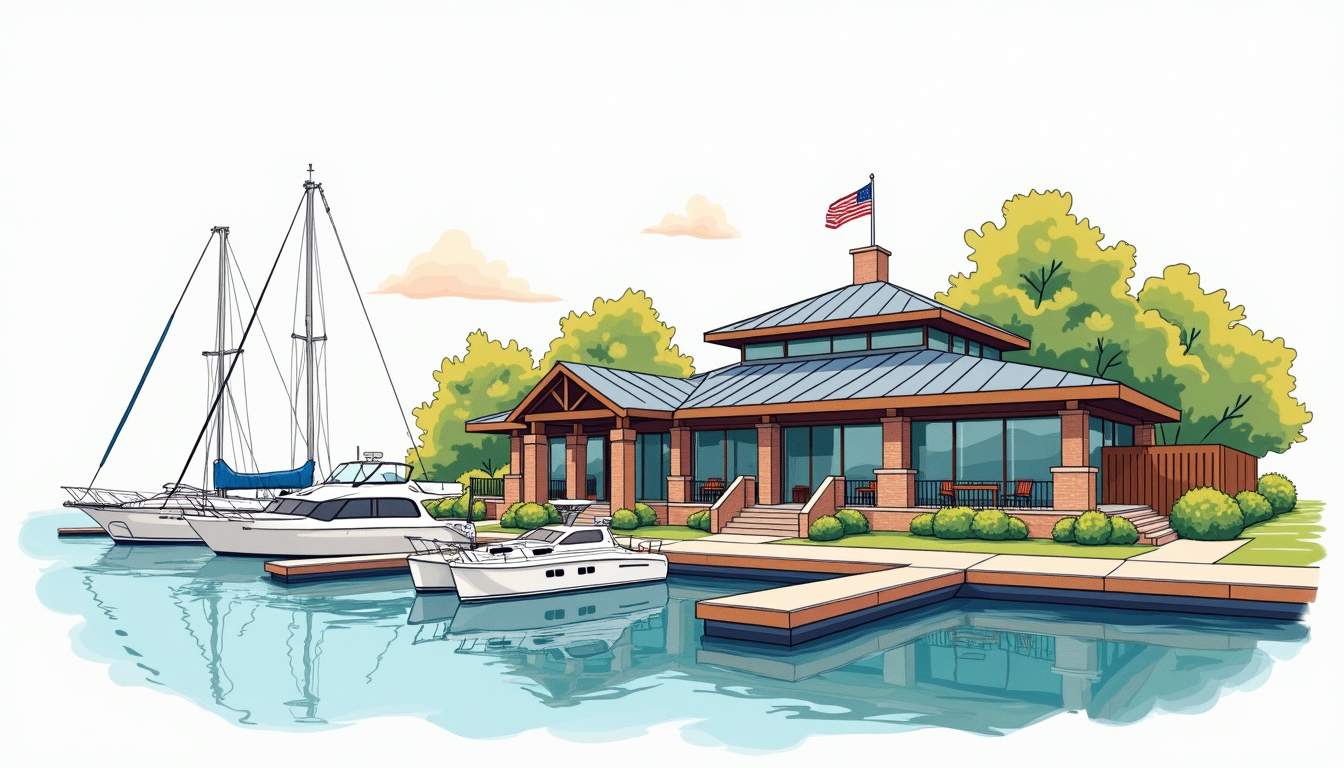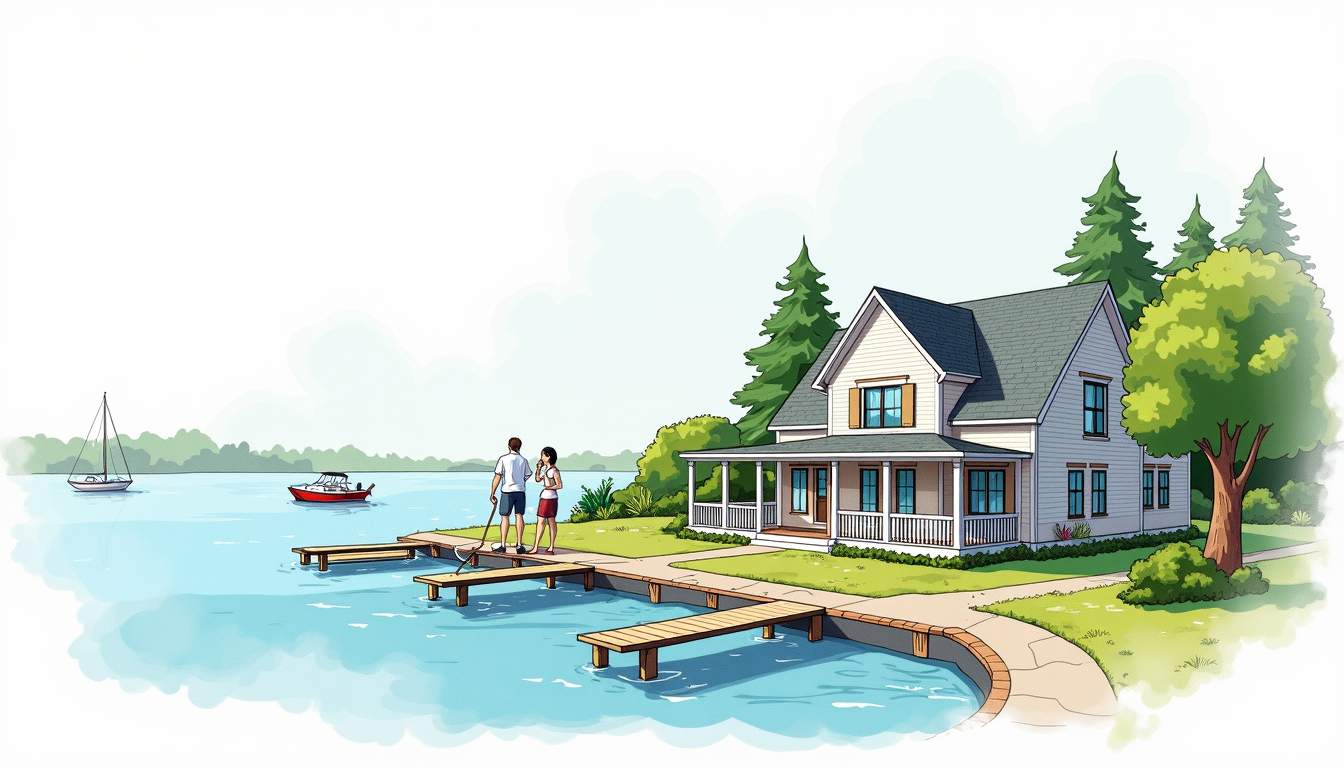
Owning a marina property with clubhouse access blends waterfront living with community convenience. Beyond the view and the boat slip, clubhouse perks can transform daily life, offering amenities that support recreation, socializing, and even work-from-home flexibility.
Marina properties appeal to a wide range of buyers: boating enthusiasts, retirees seeking a peaceful waterfront lifestyle, young professionals who value recreation, and investors looking for desirable rental income. A dock or slip attached to a residence changes the dynamic of owning a boat by removing the hassle of long-term hauling and storage.

Waterfront views and easy access to water-based activities—fishing, kayaking, paddleboarding, and private cruising—add lifestyle value that often translates to greater long-term demand. For many buyers, the intangible benefits like sunsets over the water and the soothing sound of waves are as important as practical considerations.
Additionally, marina properties often boast enhanced security features such as gated access and on-site personnel, which provide peace of mind to owners concerned about their boats and belongings. The convenience of on-site maintenance services and fuel stations further elevates the ownership experience, making day-to-day boating and care effortless.
Many marinas are also situated near vibrant local dining and shopping districts, offering residents the blend of tranquil waterfront living with easy access to urban amenities. This mix of relaxation and convenience makes marina homes particularly appealing to those seeking an active yet serene lifestyle.
Marinas commonly foster tight-knit communities. Neighbors tend to share interests in boating, marine maintenance, and outdoor living, which can create social opportunities and mutual support. Clubhouses become natural gathering points where events, workshops, and informal meetups happen, strengthening the social fabric within the development.
Clubhouses vary in scale and sophistication, but several common amenities tend to appear across developments. Understanding what comes standard, what’s optional, and what carries extra fees is essential when comparing properties.
Popular clubhouse features often include fitness centers, swimming pools, event rooms, grilling areas, business centers, and guest suites. Some high-end developments add mariners’ lounges, boat maintenance bays, private storage, and concierge services tailored to boat owners.
A well-equipped fitness center and pool complement an active, waterfront lifestyle. These amenities support daily health routines without the need for a separate gym membership. Recreational spaces like multipurpose courts and yoga studios expand activity options and encourage neighbors to connect through shared classes.
Many clubhouses also integrate wellness programs such as personal training sessions, aqua aerobics classes, and guided meditation workshops. These programs enhance community engagement while promoting holistic health benefits, making the clubhouse not just a facility but a hub for well-being.
Event rooms and social lounges make hosting easier, whether for private gatherings or community events. These spaces can often be booked by residents for celebrations, club meetings, or even neighborhood markets. Outdoor decks and barbecue areas extend usable space during mild-weather months.
Some developments feature themed event spaces or state-of-the-art audio-visual setups that cater to a variety of entertainment needs, from movie nights to live music performances. This versatility ensures that social spaces remain vibrant and well-utilized throughout the year.
Business centers or co-working spaces inside a clubhouse provide quiet areas for remote work and meetings. High-speed internet, conference rooms, and private booths add professional convenience that suits residents who split time between the office and the water.
Additional amenities such as printing services, secure package delivery lockers, and on-site IT support often complement these workspaces. These thoughtful inclusions help residents maintain productivity and streamline their daily tasks without leaving the community.
Clubhouse amenities can increase a property’s perceived value and improve resale prospects. Buyers often pay a premium for access to shared facilities that enhance everyday convenience and entertainment. For rental properties, well-appointed clubhouses can justify higher nightly or monthly rates.

Shared amenities also spread maintenance costs across the community, meaning individual owners rarely need to invest in expensive private facilities. That said, homeowners association (HOA) fees and special assessments must be considered to understand the total cost of ownership.
Pooling resources for landscaping, pool upkeep, security, and clubhouse staffing reduces the burden on individual homeowners. While HOA fees cover these services, the net effect is access to high-quality amenities without bearing the full expense personally.
Marina communities often have enhanced security measures such as gated access, surveillance, and onsite management. These features can reduce risk and sometimes improve insurance rates. Additionally, clubhouses provide safe, weather-protected spaces for socializing and storing equipment.
When evaluating marina properties with clubhouse perks, the decision should weigh current lifestyle needs, long-term plans, and financial implications. A checklist of factors helps clarify whether a specific development aligns with personal priorities.

Important considerations include HOA rules, slip ownership versus rental, flood zones, maintenance responsibilities, and the financial health of the community association. Due diligence prevents unpleasant surprises after purchase.
Determine if boat slips are deeded, leased, or offered on a transient basis. Deeded slips convey ownership and greater control, while rented or assigned slips may limit long-term availability. Some communities limit slip sizes or types of watercraft, so confirm restrictions before buying.
Review HOA bylaws, recent meeting minutes, reserve studies, and financial statements. A well-funded reserve indicates proactive maintenance planning; frequent special assessments or delinquent dues can signal fiscal instability. Covenants and restrictions often dictate clubhouse usage, guest policies, and rental rules—read them carefully.
Waterfront properties face unique environmental risks such as erosion, storm surge, and changing water levels. Investigate local flood maps, historical storm impacts, and any planned shoreline projects. Zoning regulations, dredging schedules, and harbor master rules can affect boating access and future development.
Thorough inspections protect buyers from hidden issues. Beyond a standard home inspection, specialized assessments for marina properties and clubhouse facilities are strongly recommended. These evaluations expose structural concerns, safety code violations, and deferred maintenance.
Engaging experienced professionals who understand marine systems and community amenities is crucial. A little upfront expense on inspections often saves much larger remediation costs later.
Piers, pilings, bulkheads, and docks deserve focused attention. Look for rot, corrosion, marine borer damage, and compromised fasteners. If seawalls or riprap are present, evaluate their condition and any recent repairs. Access to the slip during low tide or storm conditions should be tested if possible.
Inspect clubhouse structural integrity, roofing, HVAC, plumbing, and electrical systems. Make sure safety systems like sprinklers, alarms, and emergency lighting are up to code. For pools and spas, check filtration, heaters, and water treatment records to avoid costly upgrades.
Confirm property boundaries and any easements related to marina access. Investigate title for potential liens or disputes, and verify that the slip’s usage rights are clearly documented. If the marina operates under a permit or lease with local authorities, review those agreements to understand long-term viability.
Leverage inspection findings, HOA financials, and local market conditions to negotiate favorable terms. Sellers may be willing to contribute to repairs, offer credits, or adjust price expectations if deficiencies are documented.
Understand which clubhouse amenities are negotiable in terms of access or future improvements. In some cases, buyers can request clauses that protect against unexpected increases in HOA dues or mandate reserve contributions for specific repairs.
Timing matters in waterfront markets where inventory can be limited. Watch seasonal trends—some buyers prefer winter closings to prepare for spring boating, while others capitalize on off-season negotiating leverage. Local sales data helps determine a fair offer price.
Include contingencies for financing, clear title, satisfactory inspections, and HOA approval. For investors, a backup plan—such as flexible rental strategies or resale timelines—protects against market shifts. Where applicable, request seller disclosures about prior flooding, sinkholes, or major clubhouse repairs.
Once the property is acquired, smart improvements and thoughtful use of clubhouse amenities can maximize enjoyment and long-term value. Maintain a balance between personalization and preserving the community’s character to avoid violations of HOA rules.
Active participation in HOA meetings and community events builds relationships and provides influence over future clubhouse upgrades. Engaged owners can help steer reserve budgets and amenity priorities toward projects that raise property values.
Adopt a preventative maintenance schedule for boat systems, dock hardware, and exterior surfaces. Proper care of marine-grade materials extends their lifespan and prevents costly emergency repairs. Keep a record of maintenance activities to support future resale discussions.
If short-term rentals are permitted, advertise the convenience of marina access and clubhouse facilities to attract premium rates. Highlight unique selling points like deeded slip access, private dockside seating, and clubhouse amenities in listings to stand out in the market.
Choosing a marina property with clubhouse perks is a lifestyle decision with real financial implications. The right property combines reliable marine infrastructure, transparent HOA governance, desirable amenities, and alignment with personal or investment goals.
Effective due diligence—inspecting marine infrastructure, understanding club rules, and reviewing financials—reduces risk. Prioritize properties that provide a balance of amenity quality, sensible fees, and long-term resilience to environmental changes.
Before making an offer, confirm slip ownership status, examine HOA documents, conduct marine and clubhouse inspections, evaluate flood and environmental risks, and verify resale and rental potential. Use these findings to negotiate terms and structure contingencies.
Marina living can be richly rewarding when the advantages of waterfront access are combined with clubhouse conveniences. Thoughtful evaluation and active community participation help ensure that the purchase brings years of enjoyment and solid returns.
Embrace the perfect blend of waterfront luxury and community convenience at Tennessee National. Our premier gated community offers a private marina, exceptional clubhouse amenities, and stunning natural surroundings designed to complement your active lifestyle. Whether you seek a move-in ready home or a custom build, explore living options that elevate your marina property experience. Schedule a Private Tour today and start making memories daily in this unparalleled resort-style setting.